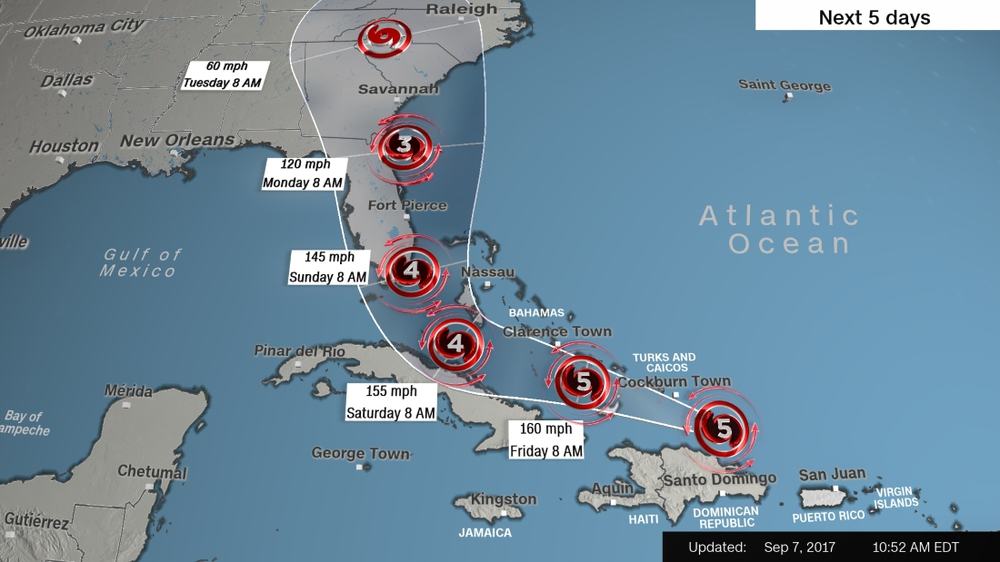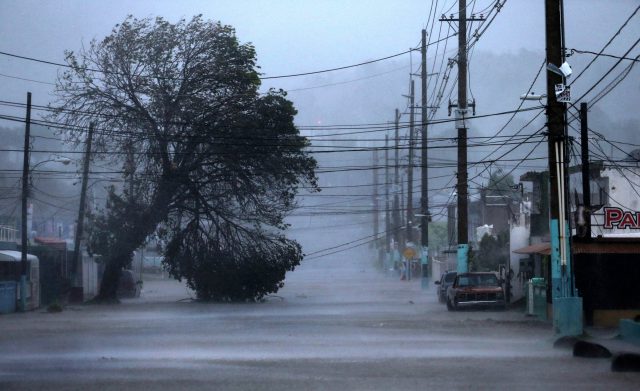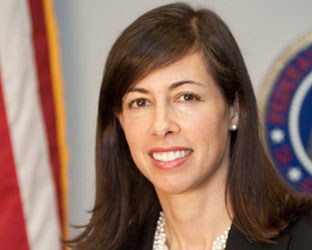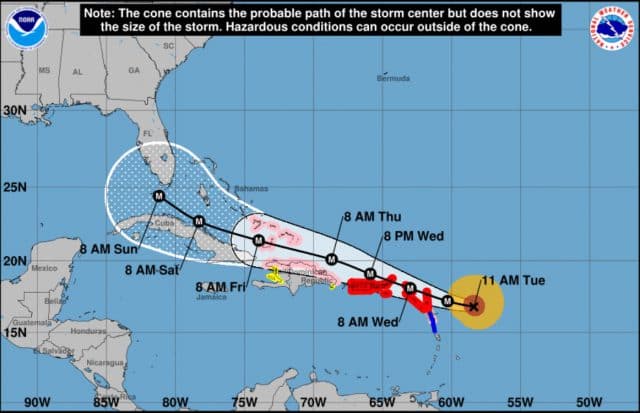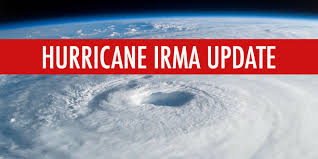 Unattended generators that have run out of fuel and exhausted battery backup systems are causing additional service outages for telephone and wireless customers in Florida, Georgia, Alabama, Puerto Rico, and the U.S. Virgin Islands.
Unattended generators that have run out of fuel and exhausted battery backup systems are causing additional service outages for telephone and wireless customers in Florida, Georgia, Alabama, Puerto Rico, and the U.S. Virgin Islands.
Although the last remnants of Hurricane Irma are now a mild rainmaker moving into the Ohio Valley, the impact of the storm at its peak is still being felt across the southeast, and some customers are surprised to discover new outages even as providers work to restore service in the region.
Data from the Federal Communications Commission and from impacted providers indicate that new cell towers are failing because backup generators have now run out of fuel. Technicians often cannot reach the cell tower sites to refill generator fuel tanks because of driving restrictions and inaccessible roads. The worst outages continue in rural parts of Florida, the Florida Keys, the U.S. Virgin Islands and parts of Puerto Rico.
Most of the telecommunications network failures are a result of power interruptions. Most cell towers are able to withstand hurricane force winds and short-term flooding, and underground fiber connectivity between the tower and the provider means failures from trees falling on utility poles is not usually a problem. In most cases, once power returns, cell towers will return to service almost immediately.
Wireline facilities in Florida are not faring as well, however.
911 Call Centers
Since yesterday, the FCC reports 29 emergency 911 call centers are down or compromised, up from 27 a day earlier:
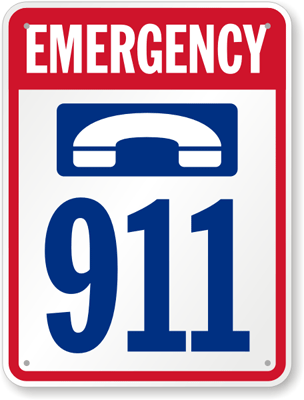 In Florida:
In Florida:
Down with no re-routes: Homestead Air Force, Marathon County SO, and Ocean Reef
Up without Automatic Caller Location Information (ALI): Cape Coral PD, Collier County EOC, Ft. Myers Police Department, Hardee County Back Up, Hardee County Sheriff, Highlands County Sheriff, Lee County Emergency Dispatch Center EOC, Lee County Sheriff, and Okeechobee County Sheriff’s Department
911 Calls Re-routed with ALI: Atlantic Beach PD, Belle Glade PD, Broward County South Region, Indian River SO, Manalapan PD, Miami Beach PD, Neptune Beach PD, Sanibel Police Department, and St. Augustine PD
911 Calls Re-routed without ALI: Big Cypress Indian Reservation, Clewiston Police Department, Desoto County Sheriff, Glades County Sheriff, Glades County Sheriff Back Up, Hendry County Sheriff, Lee County Backup, and Naples PD
In the U.S. Virgin Islands, the 911 call centers in St. Croix and St. Thomas cannot locate callers and calls from Voice over IP phone lines do not provide the number the person is calling from.
Wireless
As of Sept. 12, the worst affected areas with cell towers out of service:
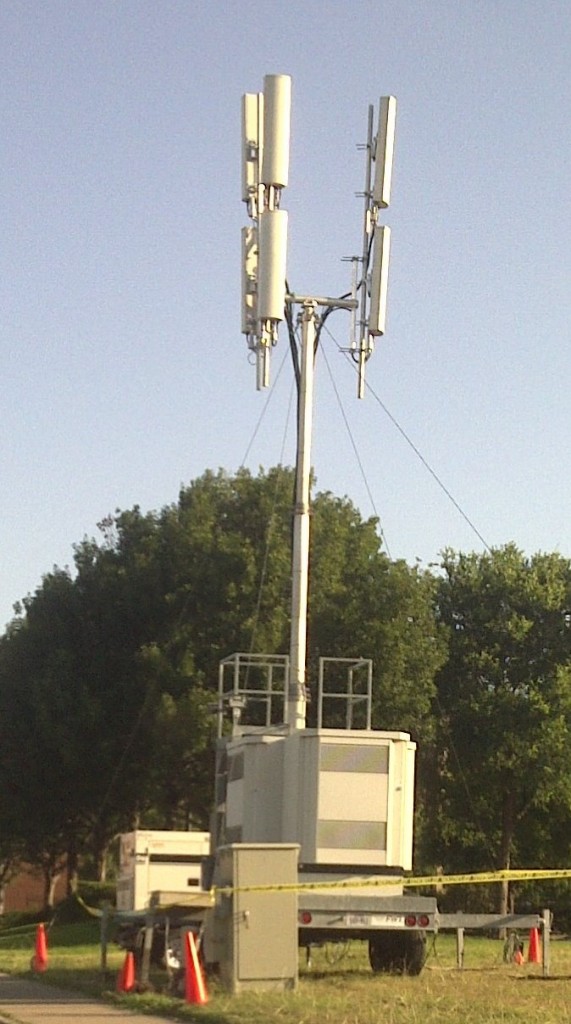
Cell tower on wheels
Alabama: Less than 1% of cell sites in the disaster area are out of service — two of the 87 cell sites in Henry County are offline.
Florida: 24.6% (down from 27.4% yesterday) of all cell sites in the state are out of service. The worst affected counties:
- Collier: Out of 212 sites, 154 are out of service (72.6%)
- Hendry: 36 of the county’s 46 cell sites are down (78.3%)
- Highlands: 43 of 80 cell towers are out of service (53.8%)
- Monroe: 89 of 108 cell towers are out of service (82.4%). Much of Monroe County is in the Florida Keys.
- Union: Seven of 13 cell sites are not functioning. (53.8%)
Georgia: 10.5% of cell sites in the designated disaster area are out of service. Wilkes County is hardest hit, with one of the county’s two sites out of service. Other significantly affected counties include: Glynn (26.2%), Camden (17.4%), Mitchell (14.7%), Brooks (14%), and Colquitt (12.2%).
Puerto Rico: Puerto Rico: 14.5% (down from 19.4% yesterday) of cell sites are out of service.
U.S. Virgin Islands: 53.8% (down from 55.1%) of cell sites are out of service.
Wireline (Cable and Telephone)
There are at least 7,184,909 (down from 7,597,945 yesterday) subscribers out of service in the affected areas in Alabama, Florida, and Georgia. This includes users who get service from cable or wireline providers.
A massive spike in landline central office failures was also documented yesterday, with service outages at switching centers up from 390 yesterday to 819 today in Florida.
Customer complaints are starting to rise based on early predictions that once power was restored, telecommunications services would quickly follow. That has not always been the case in South Florida, however.
Comcast’s Wi-Fi hotspots are all functioning normally, as long as there is internet service in the neighborhood. But home broadband outages are common, especially in coastal areas and in the Florida Keys. Where power is out, Comcast services go out with it. Getting service back requires first restoring power.
“As of Tuesday morning, we have been able to restore power to some but not all of the equipment that services customers in the Miami-metro area. We are working very closely with Florida Power and Light so they can prioritize these critical facilities and restore commercial power service to them as quickly as possible,” said Mindy Kramer, a Comcast spokesperson. “Our facilities in South Florida have been running on generators since the storm began and unfortunately everyone is need of the same fuel resources. We have been doing our best to refuel these generators so that our facilities are able to stay functioning without commercial power. We have teams deploying additional generators today in South Florida.”
Comcast has a website for customers to report storm impact issues: https://www.xfinity.com/florida.
AT&T U-verse customer Ron Dias in Southwest Miami-Dade lost his bundled services — TV, Internet and digital home phone — Saturday and they are all still out, even though his power was restored Monday. He wants answers.
“I wish they would tell us what is going on. This is the information age,” he told the Miami Herald.
AT&T is treating its outage and restoration information as a proprietary trade secret, much to the frustration of customers like Dias.
AT&T issued the same statement to media outlets:
“In Florida, South Carolina, Alabama and Georgia some [U-verse] customers may be experiencing issues with their service because of flooding and storm damage. Our technicians are working to restore service to affected areas as quickly and safely as conditions allow. Our Network Disaster Recovery team is deploying portable cell sites to the Florida Keys, Miami and Tallahassee. Additionally we are deploying an electronic communication vehicle, command center and a hazmat team to Miami. We have additional resources being staged for further deployment across the region. We are monitoring our network closely and are coordinating with emergency management officials and local utility companies.”
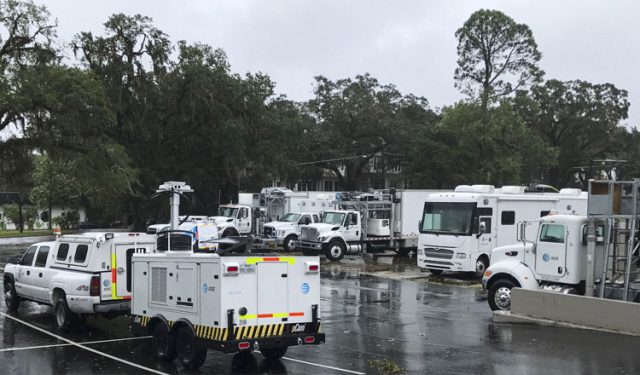
AT&T stages repair crews to deal with Hurricane Irma.
The newspaper quoted Reginald Andre, president of Ark Solvers, a company that manages computer services for condominiums and other businesses, who estimated about 80 percent of his 240 business customers are experiencing outages with either Atlantic Broadband — many of them Miami Beach condominiums — Comcast’s XFINITY or AT&T U-verse, he said. Many have their business’ phone services through the internet too. “If the internet is down, their phones are down.”
Atlantic Broadband, which serves some high-end gated communities, condos and exclusive enclaves in South Florida notes most of its customers lost service during the hurricane, but the company has already restored service to 25% of its customers.
“Atlantic Broadband’s restoration workforce is currently mobilized in Florida and our network and facilities are intact. We have assembled additional response teams from across all Atlantic Broadband operating locations to support these efforts. As commercial power is restored and downed drops are cleared, Atlantic Broadband will be moving briskly to restore services to its customers,” the company said in a written statement.
Frontier Communications, which serves some small Florida communities as well as former Verizon service areas in Florida, has said little about the storm or its recovery efforts, except to ask customers to call the company if their services are not working after power is restored.
Verizon has announced it is relieving itself of all liabilities for Hurricane Harvey and Irma-related outages:
We must also declare a Force Majeure event for Hurricanes Harvey and Irma to the extent that there is any delay or inability by Verizon or its vendors to provide services. Under Verizon’s Service Guide and customer contracts, this declaration relieves Verizon of liability that would otherwise result from any such delays or non-performance.
Verizon Wireless reports 90% of its cell towers in Florida and 97% in Georgia are in service.
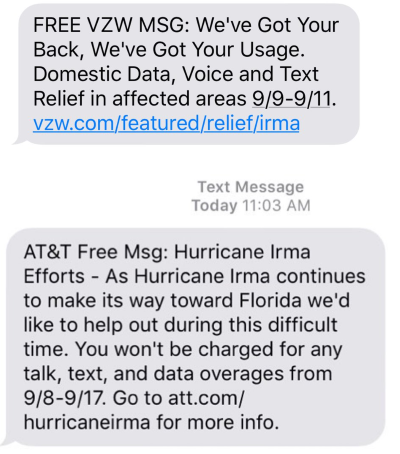
Free text messages sent to AT&T and Verizon customers in storm-affected areas. Verizon has extended its offer until Sept. 15.
“Many of those cell sites are running on backup power as designed for reliability, and massive refueling operations are underway to ensure those sites without commercial power continue in service for our customers and first responders,” the company said on its website. “We continue to assess the impact across Florida, Georgia and South Carolina, and mobile equipment and personnel have been moved into impacted areas. This week we will begin deploying Unmanned Aerial Systems (drones) to survey sites and assess antennae and tower damage. Repairs to impacted network facilities are well underway, and in many cases already complete. We are in contact with federal, state and local emergency management teams and are coordinating communication needs and efforts with them.”
Verizon is also extending its “data relief” offer until Sept. 15 in storm-affected areas. The initial offer began just after midnight on Sept. 9. Verizon is giving postpaid customers talk, text and data overage relief while prepaid customers receive an extra 3GB of data. To see if you qualify, see: Postpaid customer list of qualifying counties or Prepaid customer list of qualifying counties.
Sprint claims: “Progress is being made to the Sprint network as commercial power is gradually restoring across Florida. Sprint has fixed generators at our sites which are helping to provide service to some customers. Additionally, our network crews continue to assess any damage, refuel generators, and work to restore wireless service to customers who may be impacted. As it becomes safe, we will continue to deploy more crews, portable generators and satellite trucks providing temporary wireless coverage across the area. We are reminding people to continue to use text messaging rather than voice calling to help relieve network resources.”
Sprint is waiving all text, call and data overage fees for Sprint, BoostMobile and Virgin Mobile customers in Florida through September 15, 2017, and extending the same previously announced waived overage fees for customers in Puerto Rico and U.S. Virgin Islands through September 15, 2017. Fees will be proactively waived during the specified timeframe. Customers on Unlimited plans will continue to enjoy their unlimited data, call and text benefits. The company will also waive all international call and text overage fees for Sprint, Boost Mobile and Virgin Mobile customers in the U.S. to the Bahamas, and roaming voice and text overage charges for Sprint customers in the Bahamas, effective today through September, 15, 2017. Customers can sign in to their My Sprint account to enable international calling before attempting to make a call. They can also chat with a Sprint International Representative. Customers may cancel international calling at any time following the effective period.
T-Mobile is making it free to call and text from the United States to the Bahamas and Turks and Caicos. T-Mobile will also waive roaming fees on calls and texts for customers in the Bahamas and Turks and Caicos. The offer is good until Sept. 15. T-Mobile also is offering free calling/texting, as well as unlimited data, for Florida customers not on T-Mobile ONE (customers on T-Mobile ONE always have unlimited calling/texting/data). The Florida offer applies to T-Mobile and MetroPCS customers in the following area codes until Sept. 15: 239, 305, 321, 352, 386, 407, 561, 689, 727, 754, 772, 786, 813, 850, 863, 904, 941, 954.
AT&T is automatically issuing credits and waiving additional fees to give unlimited data, talk and texts to AT&T wireless customers and unlimited talk and texts to AT&T PREPAID customers. This is effective beginning Sept. 8 across all of Florida and Sept. 12 in impacted Georgia counties and continuing through Sept. 17 for all impacted customers. AT&T is also extending payment dates for impacted AT&T PREPAID customers with voice and text service through Sept. 17. This applies to AT&T wireless customers with billing zip codes and AT&T PREPAID customers with billing phone numbers in all of Florida and in nearly 25 Georgia counties – Appling, Atkinson, Bacon, Brantley, Bryan, Bulloch, Camden, Candler, Charlton, Chatham, Clinch, Coffee, Effingham, Evans, Glynn, Jeff Davis, Liberty, Long, McIntosh, Pierce, Tattnall, Toombs, Ware and Wayne. Customers in these areas may still receive data alert notifications during these protected dates, but billing will reflect the correct data charges.
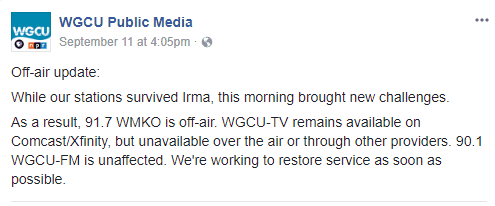 Broadcasters
Broadcasters
TV Stations out of service: 9 (up one from yesterday)
- Alabama: None
- Florida: WVFW, WGCU, WSBS (up one from yesterday)
- Georgia: None
- Puerto Rico: WOST, WMEI, WQQZ, and WWKQ (same as yesterday)
- U.S. Virgin Islands: WTJX-TV and W05AWD (same as yesterday)
Radio stations out of service: 51 (up from 25 yesterday)
- Alabama: None
- Florida: WMFM, WAXY, WDOZ, W227CP, W250BH, W274BB, W298BO, W300CL, WAQV, WFLJ, WJFH, W251BM, WROK, WAOA- FM, WHKR, WLZR, WIOD, WOLZ, WINZ, WBTT, WCKT, WZTA, WSVU, WSWN, WOTW, WMFQ, WXUS, WYGC, W240CI, W295BJ, W233AP, WMKO, WEAT, WMFL, WWFR, WJFR, WTIR, WMYR, WCNZ, W294AN, WNWF, WEJZ, WGNE-FM, and WJGO (up 19 from yesterday)
- Georgia: WLFH, WHFX, WBGA, WGIG, WEKL and WGCO (all added since yesterday)
- Puerto Rico: None
- U.S. Virgin Islands: WTJF-FM (same as yesterday)
 Customers switched to Frontier Communications from Verizon in Florida, California and Texas continue to complain they are being overcharged for service, sometimes by hundreds of dollars a month, and they’re fed up.
Customers switched to Frontier Communications from Verizon in Florida, California and Texas continue to complain they are being overcharged for service, sometimes by hundreds of dollars a month, and they’re fed up.

 Subscribe
Subscribe The Orlando Sentinel got more than it asked for when it requested readers share their experiences with utility service outages in the wake of Hurricane Irma, which pounded Florida last week.
The Orlando Sentinel got more than it asked for when it requested readers share their experiences with utility service outages in the wake of Hurricane Irma, which pounded Florida last week.





